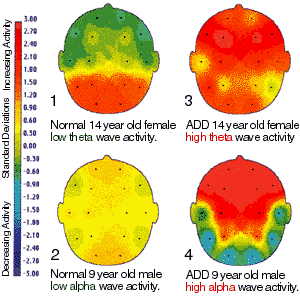Attention Deficit Disorder Information
Click here to scroll to the list of available medications ↓
Attention deficit disorder, which is nearly identical to attention deficit hyperactivity disorder, is often referred to as ADD or ADHD. Attention deficit disorder is considered a childhood disease, although a small percentage of adults suffer from ADD. Most adults have gone undiagnosed for years, and the theory is that there are numerous more adults affected by attention deficit disorder than realized. They simply go undiagnosed and have a host of complication from never receiving any type of treatment.
Considered a developmental disorder, ADD was first recognized in 1980, with an onslaught of over-diagnosis developing in the mid to late 1990’s. Symptoms of attention deficit disorder include poor impulse control, extreme temper tantrums, the inability to focus, restlessness, hyperactivity, forgetfulness, and behaviors which are considered anti social and developmentally delayed such as biting, hitting, kicking, and throwing things in order to express wants, needs, and frustrations. Attention deficit disorder can often be diagnosed when in fact the problem is poor parenting or a lack of discipline, as the symptoms also mimic behaviors displayed by children without social discipline.

Attention deficit disorder has been thoroughly studied, and although there seems to be no actual “cure,” medical science believes that it has determined attention deficit disorder to be a genetically inherited condition, claiming that nearly 60-65% of all ADD cases are genetically linked. Twins have been studied, and it is not uncommon for one twin to be diagnosed and the second twin to follow with a diagnosed a year later. Often parents with a history of attention deficit disorder also have at least one child with the disorder. Some scientific and social critics claim that these behaviors can be taught, whether it’s a twin who is no longer receiving ample attention or a child who has learned the behavior from a parent. However, adopted relations do not seem to have this linked trend while they still have the same set of parameters. These studies on adoptive families seem to dispel the critical views of familial trends in ADD.
The other 40% of attention deficit disorder cases are determined to be linked to trauma to the brain, either through birth, accident, or chemical exposure. ADD can be caused by the use of illegal recreational drugs, the abuse of prescription medications, as well as a result of huffing glues and solvents to get high.
Risk factors for ADD include genetic links or family members with the disorder. These may include immediate family members such as parents and siblings or extended family members such as cousins, grandparents and other distant relatives. Other risk factors include the chronic use of mind altering medications, especially while pregnant such as analgesics, antidepressants, and medications for bipolar disorder, as well as others.
Diagnosis of attention deficit disorder has become a little stricter over the past decade, as the psychiatric community faced severe criticism over the over diagnosing ADD. A patient must now display six symptoms for a minimum of six months including but not limited to a lack of attention to detail and careless mistakes, especially in schoolwork, the appearance of not hearing when spoken to directly, displays difficulty in organizing activities, is easily distracted, is forgetful, displays great difficulty in following through when given directions, loses implements required for activities such as pencils and rulers and other schoolwork implementation, avoids activities which requires concentration, displays difficulty in keeping attention on play activities or schoolwork, has difficulty in waiting for their turn, waiting for the appropriate time to respond, often speaks out or acts out when not appropriate, and has great difficulty remaining seated for long periods of time. Symptoms must not only be displayed for a period of six months and a minimum of six symptoms are required, but there also needs to be an evidential link to these symptoms being disruptive well beyond normal developmental stages and inhibit the child’s ability to play or attend school.
Complications from attention deficit disorder include parent-child conflict, difficulty making and retaining friends, difficulty getting through the school day, emotional responsiveness, and a 60% higher risk for failing a school year.
Treatment options may vary, although most physicians and mental health practitioners look to medication and behavior modification for treatment. Medication comes with side effects, although almost half of the children who are treated medically for ADD as well as receive cognitive and behavior modification therapies learn to cope in the world without medication as early as their teens.
Parents of children with ADD often do much better when they enter a treatment program or support group to learn how to help their child through their difficult moments without fueling significant behavioral issues. Most mental health practitioners recommend parents and children attend therapy sessions together at least once every two weeks.